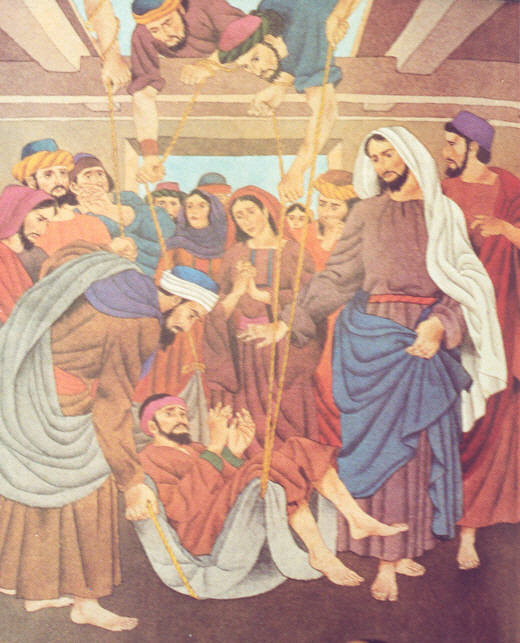
Return to
Index The Catholic Faith
Return
to Level One Topic Index
Home Page
Our Lord gradually revealed himself to his apostles and others as the son of God. He made his divinity known by performing miracles. Jesus showed his authority over sickness, devils, the wind and sea, even death itself. There was something else Jesus did that told people that Jesus was God, even when he did not say it in so many words: Jesus forgave sins.
"What is so special about that?" you might ask. Imagine that a friend told you that he had cheated on a test or stolen money. If you then said, "I forgive you", your friend would think you were crazy. What right would you have to forgive when you were not the one who was hurt by the sin?

Yet this was exactly what Jesus did. When a paralyzed man was brought to him, Jesus said, "Your sins are forgiven." This would make sense only if Jesus were God, because every sin, whoever it may hurt on earth, also breaks God's laws and wounds his love. Some of the Pharisees who were watching Jesus were angry and upset at his words. "Who is this man to speak blasphemies? Who but God can forgive sins?", they thought to themselves.
Jesus knew their thoughts, and he decided to prove that he had the power to forgive sins. When the people brought him a paralyzed man, he asked, "Which is easier, to say to the paralytic, 'Your sins are forgiven', or say, 'Stand up, pick up your mat, and walk again'? That you may know that the Son of Man has the authority on earth to forgive sins (he said to the paralyzed man), 'I command you Stand up! Pick up your mat, and go home'". (Mk 2:9-11).
And with that, the man could walk. Jesus was right. Anybody could claim to forgive sins-no one could "see" sins being forgiven. But to heal a men who had not walked in years-everyone could see that. The people realized that Jesus meant what he said, that he really could forgive sins.
As glad as Jesus was to heal people of pain and sickness, he really came to heal their souls from sin. Many people in Jesus' time believed that they were too sinful to be forgiven. The Pharisees had taught them that one could not please God unless he observed Jewish law without a single mistake. Jesus, on the other hand, tried to convince the people that God was always ready to forgive. All the person had to do was repent of his sin and ask God's forgiveness. Jesus taught that God was happier over one sinner who repents than any number of good people who do not need to repent. To illustrate this truth he told the parable of the lost sheep and the parable of the prodigal son. You can read these parables in Luke 15.
Inspired by this new message of God's compassion, sinners came to Jesus, seeking forgiveness. When Jesus forgave them, they often found the power to become saints. Mary Magdalen turned from a life of impurity to become one of Jesus' most faithful followers. Zacchaeus, a tax collector who was seen as a traitor by the Jews, promised to give half of his money to the poor and return four times the amount of any money he had taken from others. The good thief who died on the cross next to Jesus received the gift of eternal life, "This day you will be with me in Paradise."
Jesus asked us imitate God's readiness to forgive. We should gladly forgive others who sin against us, no matter how often it happens. We must forgive others if we want to be forgiven ourselves. Every day we pray in the Lord's prayer, "Forgive us our trespasses as we forgive those who trespass against us." With these words we are asking God to forgive us as much as we forgive others. We should think hard about this, especially if we are in the habit of staying angry for a long time at those who hurt us. We certainly would not want God to behave this way toward us. So we must act quickly to forgive anyone who wrongs us.
How do you forgive someone? There are different ways to forgive. For example, if a brother or sister comes to you saying, "I am sorry for what I did", your job is to say, "I forgive you" or, "That's okay" and then show that you mean it. Act as if nothing had happened. Be extra friendly for a while, to make the "sinner" feel better.
What if the "Sinner" does not want to be forgiven? Perhaps there is someone who has decided not to like you and who tries to say and do things that hurt you whenever he can? Such a person might only laugh if you said, "I forgive you". Sometimes people hurt us because they think we do not like them. You might say to this person, "Let's be friends", or ask him to join you and your friends in an activity. But if an offer of friendship will not work, then simply forgive the sinner in your heart. And pray for him every day. Prayer can do much to change other people.
Used with the permission of The Ignatius Press 800-799-5534
Return to Index The Catholic Faith
Return
to Level One Topic Index
Top
Home Page